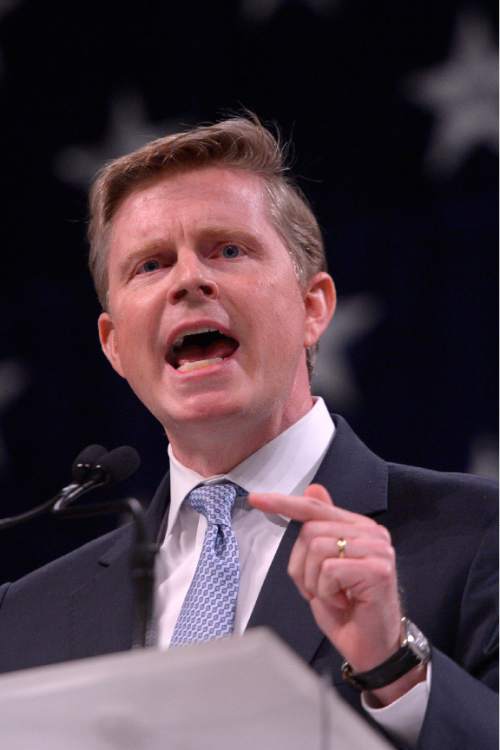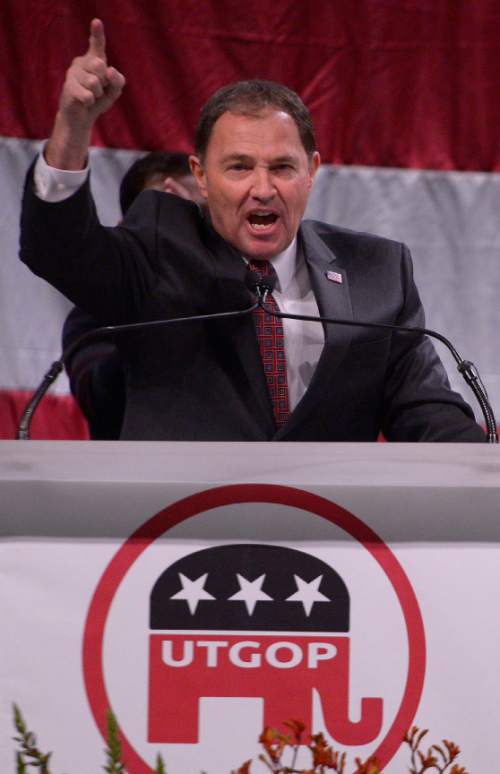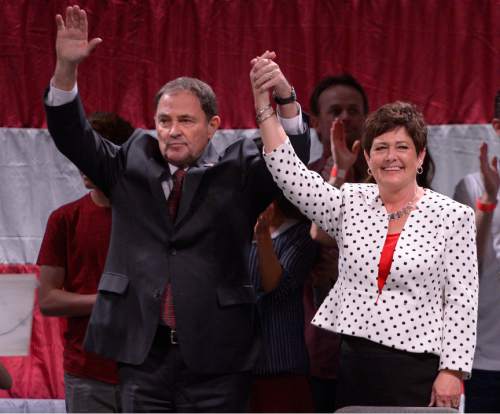This is an archived article that was published on sltrib.com in 2016, and information in the article may be outdated. It is provided only for personal research purposes and may not be reprinted.
Gov. Gary Herbert's campaign is piggybacking a major fundraiser on top of a two-day energy summit, encouraging the sponsors and attendees at the policy event to pony up thousands of dollars to attend a special roundtable to boost the governor's re-election bid.
The campaign is asking the companies and individuals attending the event to pay $1,500 per person to attend the roundtable on May 24, the opening day of the fourth annual Governor's Utah Energy Development Summit. They can also purchase a table for four and sponsor the roundtable for $5,000.
It is not the first time Herbert has hitched the fundraiser to the energy summit, which draws representatives from some of the region's biggest energy producers to the state for the two-day event.
But after reports of a speed-dating arrangement, where Herbert would meet for 20 minutes to discuss policy issues with lobbyists' clients that bring campaign checks, questions are again being raised about the propriety of marrying energy policy and political donations to power Herbert's re-election.
Dave Hansen, campaign manager for Herbert's Republican challenger Jonathan Johnson, said the governor can raise money from whomever he wants, but soliciting donations from attendees at a policy gathering pushes the line.
"This whole arrangement of having the governor's official conference and piling on a fundraiser … doesn't really pass the smell test when it comes to ethical behavior," Hansen said. "It's just this kind of a cozy relationship is what you get when you have career politicians. The ethical lines tend to get a little blurred after a while."
Herbert's campaign spokesman, Marty Carpenter, said it is the third year the governor has held a fundraiser in conjunction with the energy summit, but because he is not wealthy, the governor cannot self-fund and relies on the support of donors.
The energy roundtable fundraiser is "entirely separate" from the summit, Carpenter said, and run completely by campaign staff with no state resources used.
"Having to raise large amounts of money to conduct election campaigns is a fact of life for those who seek public office, and it enables people from every walk of life to seek office and to build a base of support," Carpenter said. "Holding public office should not be a right reserved only for the super wealthy, whether you're talking about a libertarian like Johnson or a Democrat like [Mike] Weinholtz."
Matt Pacenza, executive director of the Healthy Environment Alliance of Utah, said Herbert's energy policy appears to reflect the wishes of his wealthy donors who have the governor's ear.
"The worst thing government can do is to give the appearance that citizens who wish to influence policy must 'pay to play,'" Pacenza said. "The roster of speakers at the Governor's Energy Summit and the expensive ticket for his accompanying campaign fundraiser sends a strong message that our state's energy policy will be mostly shaped by deep-pocketed fossil-fuel interests."
Many of the sponsors of the upcoming energy summit have already been generous contributors to the governor's campaigns over the years. PacifiCorp, for example, the parent company of Rocky Mountain Power, has given Herbert $42,000 since 2012; Questar has donated $55,000 to him; Tesoro and Chevron have given more than $20,000 each in that period.
The sponsors of the event — more than 50 in all — pay the expense for almost the entire summit, according to Jeff Barrett, deputy director of the Governor's Office of Energy Development, and the event is organized by the Utah Media Group.
The company handles circulation and advertising for The Salt Lake Tribune and the Deseret News.
About $20,000 in taxpayer funds go to buy gifts and publish materials for the conference, Barrett said, and the office lines up speakers for the event.
About 1,200 people are expected to attend the two-day conference, a third of them visitors from outside the state.
"We became aware of [the fundraiser]. We're part of the governor's office," Barrett said. "But there's a bright line between the governor's office and the campaign. If they see value in piggybacking on our event, that's good, but we have no involvement in that."
Keynote speakers for the event include Scott Saxberg, CEO of Crescent Point Energy, which is seeking to drill as many as 4,000 new oil and gas wells in eastern Utah, and Philip Moeller, a senior vice president at Edison Energy Institute and former member of the Federal Energy Regulatory Commission.
Session topics include panels on Utah's mineral opportunity, managing water and energy in the state, safety innovations in the extractive industries, the growth of federal regulations on energy producers, and advancing air quality alongside energy production.
Pacenza said the agenda points to a focus on "dirty, costly, dangerous fossil fuels that Governor Herbert's energy policy revolves around," and said more voices, not just those from the extractive industries, should be heard.
"It certainly appears Governor Herbert's energy policy is shaped most by contributors with deep pockets, rather than science or the many Utah entrepreneurs and citizens eager to lead the state to a cleaner, safer energy future," he said.
Herbert's campaign has been under fire for its fundraising tactics since last week, when The Tribune reported that campaign staffer and lobbyist Doug Foxley suggested a type of speed-dating with the governor. In a meeting with a few dozen lobbyists and supporters, Foxley told of an arrangement where the governor had come to Foxley's office and met for 20 minutes each with seven companies that donated to the governor's campaign.
Campaign finance disclosures filed this week identify at least five of Foxley's clients who gave donations to the governor's campaign on the same day: Big West Oil gave $4,500; Peak Minerals, $5,000; Gold Cross Ambulance, $5,000; Maverik convenience stores, $7,500; and the Utah Association of Financial Services, $5,000.
Herbert's campaign said the governor was adamant that there would be no "quid pro quo" for donors and they would receive no special treatment as a result of their campaign contributions.
Carpenter said Johnson, who is chairman of the board of Overstock.com, has been relying almost exclusively on donations from the company, its CEO Patrick Byrne, and a libertarian political action committee.
Carpenter also said that, while the Herbert campaign fully reports all of his contributors, the Johnson report shows hundreds of thousands of dollars in in-kind donations from campaign consultants and staff, "which is both highly unusual and is contrary to the spirit of full and open disclosure."
Not itemizing expenditures makes it difficult for the public to track how a campaign is spending its resources.
In 2010, during Herbert's first run for governor, his Democratic opponent Peter Corroon hammered Herbert over alleged special treatment given to big donors, in particular a contractor who received a controversial $1.1 billion state contract to rebuild Interstate 15 through Utah County. Herbert went on to trounce Corroon in that election.
Twitter: @RobertGehrke







